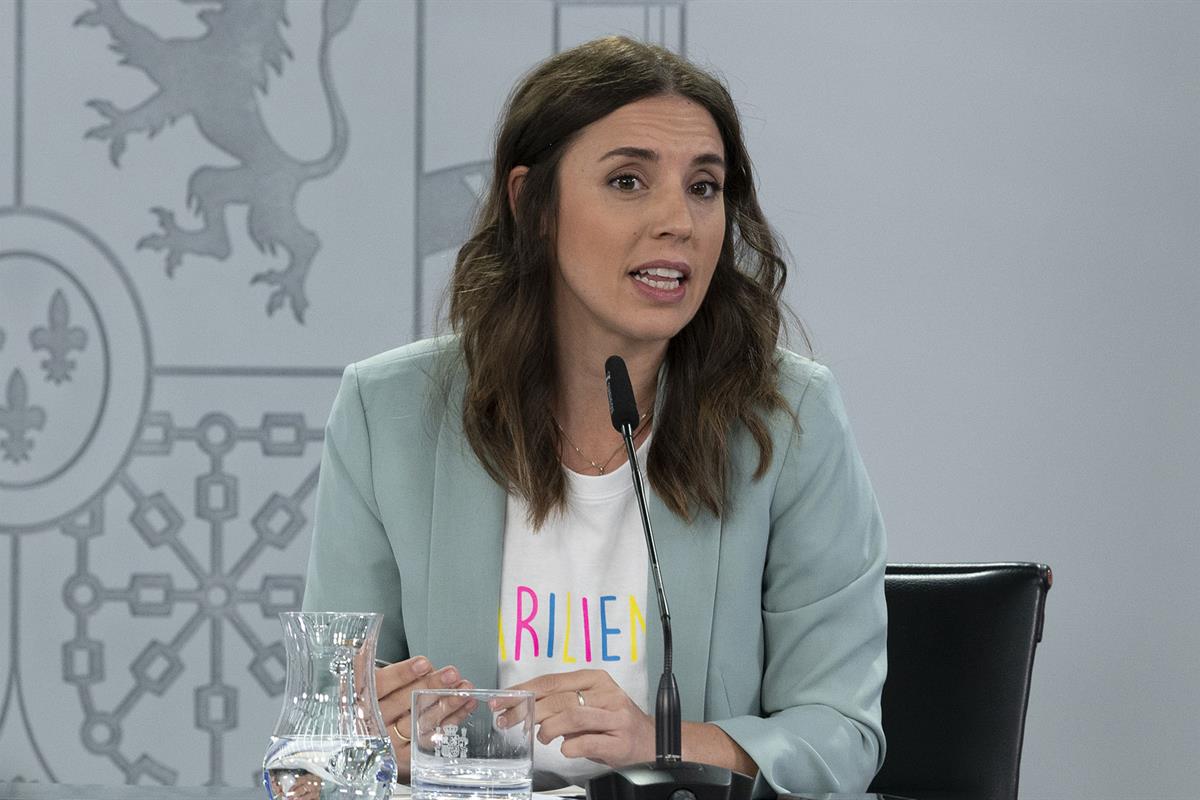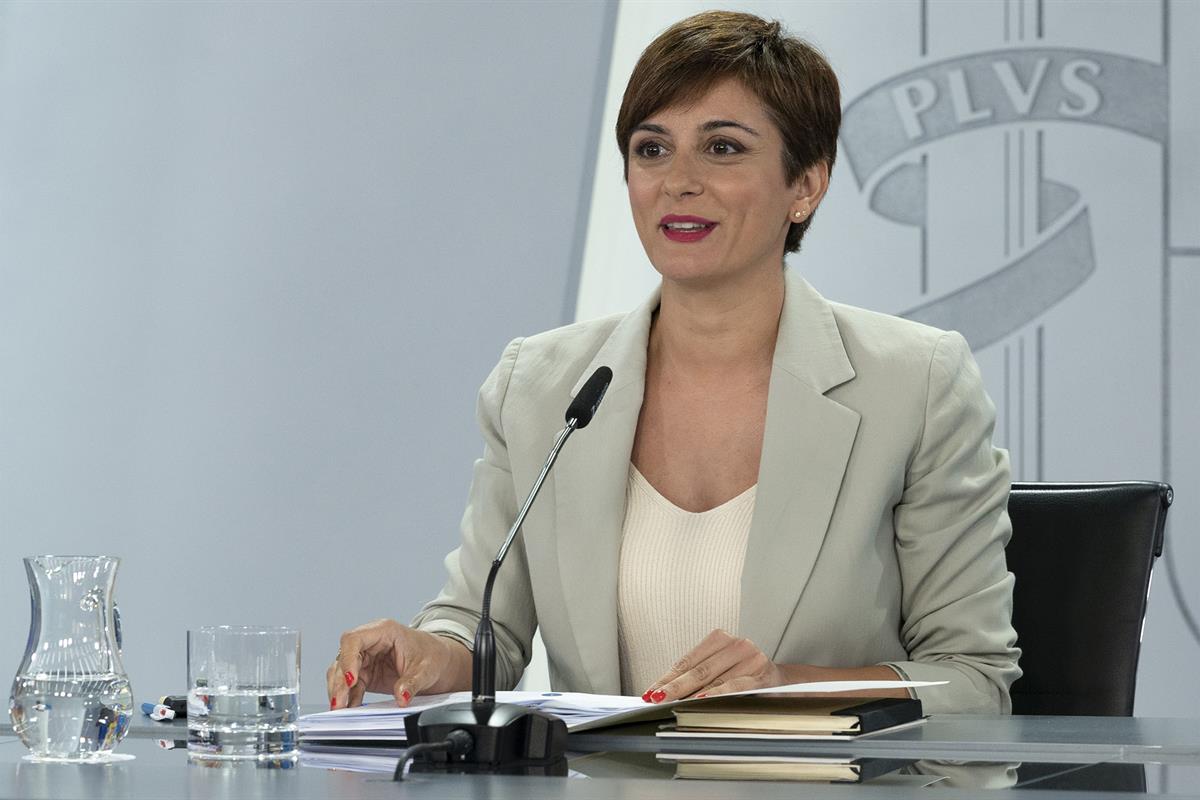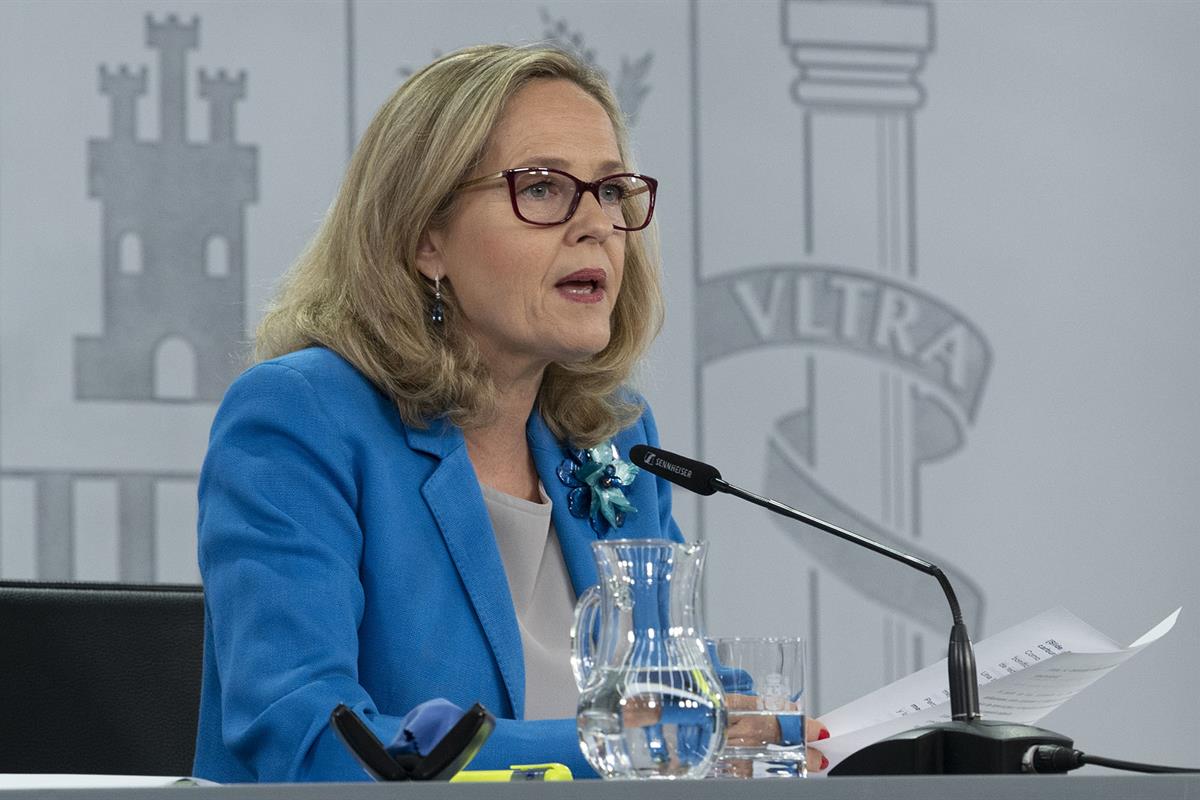The Government of Spain approves the draft law for the equality of transgender people and the guarantee of LGBTI rights
Council of Ministers - 2022.6.27
Moncloa Palace, Madrid
The Council of Ministers has agreed to send to the Spanish General Courts the Draft Law for the Real and Effective Equality of Trans Persons and for the Guarantee of the Rights of Lesbian, Gay, Trans, Bisexual and Intersex Persons (LGTBI). The text establishes the principles for action by public authorities, regulates the rights and duties of both public and private natural and legal persons, and provides for specific measures against all forms of discrimination.
The Minister for Equality, Irene Montero, has stated that, if in 2005 Spain was already at the forefront of the recognition of LGBTI rights thanks to the modification of the Civil Code that allows marriage between people of the same sex, with this new law the country is once again an international reference in defence of the rights of LGTBI people and particularly transgender people.
"We hope that this law can be passed as a matter of urgency, because LGTBI lives, particularly trans lives, can wait no longer," she said.
Recognition of rights for LGTBI and trans people
 Foto: Pool Moncloa/Borja Puig de la Bellacasa
Foto: Pool Moncloa/Borja Puig de la Bellacasa
Montero explained that the law establishes the right to self-determination of gender identity and the depathologisation of this recognition: "The state recognises trans people's right to be who they are, without witnesses, without any obligation to undergo hormone treatment for 2 years and without a medical report that must say that they are sick".
This recognition procedure will be carried out by means of a double appearance system within a maximum period of four months for persons of legal age, and also for those aged between 16 and 18 years. Those aged between 14 and 16 years will need parental authorisation and for those aged between 12 and 14 years the procedure can be carried out through voluntary jurisdiction proceedings. Children under the age of 12 may change their name on their National Identity Card (DNI). In addition, trans migrants will be able to change the documents issued in Spain if their rights are not guaranteed in their country of origin.
Regarding the protection of intersex children, genital modification surgery will not be allowed and the deadline for their families to register their sex will be extended.
Conversion therapies banned
The future law prohibits conversion therapies and, if they occur, they could be classified as a very serious administrative offence, with penalties of between €10,001 and €150,000.
"LGTBI lives do not need a cure", said the minister. "What needs a cure is LGTBIphobia, and this can be cured with comprehensive sex education, with education for equality and with education in diversity". To this end, specific educational content will be reinforced. In addition, children under the age of 12 should be addressed in schools according to the name chosen.
Lesbian and bisexual women will be able to parent their children without being married, as is currently the case. It also gives legal status to the right of access to assisted reproduction techniques, which was already established in the regulations, both for transgender women and transgender people who are able to bear children.
In the field of employment, equality and non-discrimination of LGTBI people in the workplace is promoted, with special attention to the inclusion of trans people and, above all, trans women, "who have the greatest gap and the greatest difficulties in accessing employment", said Irene Montero.
In the sanctioning regime, in addition to conversion therapies, discriminatory educational content in textbooks and educational teaching materials will be considered very serious offences and, unless they become criminal offences and are referred to criminal proceedings, also acts of harassment. Minor offences, such as insults and discriminatory messages, can be sanctioned with amounts ranging from €200 to €2,000, and serious offences, such as not hiring a person because of their sexual orientation, can be fined up to €10,000.
Institutional statement for LGTBI Pride Day
Minister Irene Montero stressed that the approval of this bill coincided with tomorrow's commemoration of National LGTBI Pride Day under the slogan "Pride of the Country".
The Government has approved an institutional declaration to reiterate the institutions' and Spanish society's commitment to the rights of LGTBI people, "so that all LGTBI lives are worth living, so that there are no closets, and so that everyone can be who they are and can live their lives with freedom", said Montero.
Securities market's new regulations
The Council of Ministers has approved the Draft Law on Securities Markets and Investment Services, which will be sent to Parliament for processing.
The First Vice-President of the Government of Spain and Minister for the Economy and Digital Transformation, Nadia Calviño, explained that the regulation reforms the current law, enacted in 2015, to adapt it to the regulations and technological changes that have taken place since then and those that are expected, such as crypto-assets.
The aim is to provide greater legal certainty, strengthen investor protection and improve the competitiveness and efficiency of securities markets in Spain, with special attention to the financing of SMEs "so that they can contribute to financing economic growth and can be among the most attractive and most advanced in Europe", he said.
Areas affected by forest fires
 Foto: Pool Moncloa/Borja Puig de la Bellacasa
Foto: Pool Moncloa/Borja Puig de la Bellacasa
The Executive has agreed to declare the communities of Andalusia, Aragon, Castile and Leon, Catalonia, Navarre, Valencia and Murcia, which suffered serious forest fires in June, as areas seriously affected by civil protection emergencies.
The fire has devastated 53,000 hectares of land, of which 31,000 hectares were concentrated in the province of Zamora, according to data provided by the Minister for Territorial Policy and Government Spokesperson, Isabel Rodríguez.
In addition to the environmental damage, these fires have required the preventive evacuation of almost 4,000 people and caused serious damage to infrastructure, public and private property, crops and farms, industrial estates and other productive facilities, which have not yet been fully quantified.
Air and Space Army
The Council of Ministers has approved the name change of the Spanish Air Force to Air and Space Army.
Isabel Rodríguez stated that this decision is in line with the Government's commitment to the aerospace industry as a strategic sector, and recalled the recent approval of the Aerospace PERTE and the planned creation of the Spanish Space Agency.
Grants and subsidies
The government has authorised six new operations of the Solvency Fund for Strategic Companies for a total of €721 million to maintain employment. The companies are Celsa, ISASTUR, Vivanta, Imasa, Meeting Point and Blue Sea, and in direct jobs alone 18,000 people are affected, said Rodríguez.
The Government has also agreed to grant direct subsidies amounting to €96.2 million to the Spanish Red Cross, the Spanish Commission for Refugee Aid and the Catholic Association for Spanish Cooperation on Migration, which provide assistance to migrants and applicants for international protection, and to increase by €73.4 million subsidies for the provision of essential services and the purchase of basic supplies for the reception of people fleeing the war in Ukraine.
Last, the Executive has updated the amounts and criteria for the distribution of funds from the State Pact against gender-based violence, which are transferred to local bodies.
Economic situation report: Spain grows in 2022
The Council of Ministers has analysed the report on the current situation of the Spanish economy, presented by the Vice-President of the Government of Spain, Nadia Calviño.
According to data from the National Statistics Institute (INE) published last Friday, the Spanish economy grew at the same rate as Germany and above Italy and France in the first quarter of 2022, with a year-on-year growth rate of 6.3%. "And all the indicators point to growth of the Spanish economy having accelerated in the second quarter of the year", Calviño assured.
Curbing the impact of war and containing inflation
 Foto: Pool Moncloa/Borja Puig de la Bellacasa
Foto: Pool Moncloa/Borja Puig de la Bellacasa
Calviño considered that the Government of Spain has faced the current moment of uncertainty derived from the war in Ukraine and the generalised rise in the prices of raw materials, especially energy and food, "with speed, determination and efficiency, and with two clear objectives, to contain inflation and achieve a fair distribution of the cost of the war". Spain ranks first among the major European economies in terms of the percentage of GDP mobilised to provide public support and deal with the impact of Putin's war, he added.
Thanks to the measures adopted, inflation in Spain in May was below the EU average and below the rates of 11 economies in the euro area and 16 in the European Union, including Germany, the Netherlands and Belgium: "And from today's entry into force of the Royal Decree-Law we adopted this Saturday, we have two additional instruments to contain inflation: the Iberian gas cap mechanism and a new package of measures.
As Calviño explained, the wholesale price in the Iberian market is now the lowest in continental Europe and is less than half that of Germany, France, Italy and the Netherlands, which is "an effective safety net for the coming months, where the scenario depends on the war and the outlook for the evolution of international energy prices is not favourable". The vice-president also announced that the government is working on a new tax on energy companies that are benefiting from extraordinarily high prices.
With regard to the new features contained in the Royal Decree-Law, the vice-president reviewed the most important ones: the reduction of VAT on electricity from 10% to 5%; the 50% rebate on state public transport and 30% for regional and local public transport; the 15% increase in non-contributory pensions; the freezing of the price of butane; the extension and expansion of aid to the agricultural, livestock and fishing sectors; direct aid of €200 for families and the self-employed; and the €250 million increase in aid to the gas-intensive industry, including sectors that were not currently covered, such as cement, iron and steel and basic chemical products.
Excellent labour market performance
Calviño emphasised the excellent performance of the labour market as one of the pillars of economic growth in Spain.
In the last year, 934,000 full-time jobs have been created and almost half of the jobs signed are permanent. There are 2.5 million more workers with permanent contracts, the reduction of the most precarious contracts of shorter duration continues to accelerate and there has been a strong growth in national insurance contributors in 2022. Furthermore, unemployment fell below 3 million in May, the lowest figure since 2009. "Beyond the cyclical development, there is a reduction in structural unemployment in Spain, which has been the main drag on the Spanish economy for many decades", Calviño interpreted.
The vice-president highlighted the clear impact of the labour reform on the good performance of the labour market. Thanks to its approval and the other milestones and objectives defined in the Recovery, Transformation and Resilience Plan, the European Commission has announced that it has approved the second disbursement of the NextGenerationEU Recovery Plan for Spain, amounting to €12 billion. "With this payment, Spain will have received €31 billion," he stressed.
Fiscal consolidation
The vice-president pointed to the need to take advantage of the strong economic growth and the extraordinary evolution of employment to make progress in fiscal consolidation. Calviño reported that the public deficit was reduced by 3.3 percentage points of GDP in 2021 compared to the previous year, and public debt by 1.5 percentage points. In 2022, reductions of 2 and 3 percentage points are foreseen to fall below 3% and 110% of GDP, respectively, by 2025.
NATO Summit in Madrid
The Government Spokeswoman referred to the NATO Summit to be held from tomorrow in Madrid, which is why this week's ordinary Council of Ministers has been brought forward from Tuesday to today, Monday. "The government wants this summit to be a national success that we can all be proud of," he said.
Rodriguez said that this Euro-Atlantic unity exercise will be important to fight Putin, to ensure that peace restored in Ukraine, and to stop the negative consequences that this war is having for everyone, and especially for the Ukrainian people.
Non official translation




